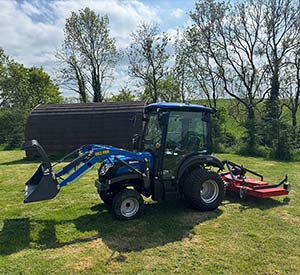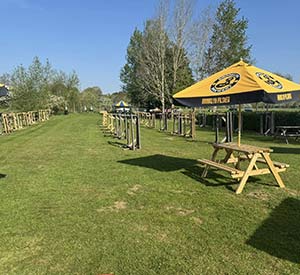Managing and maintaining public green spaces is a critical responsibility for local authorities. These spaces—parks, recreation fields, public paths, and communal areas—enhance the quality of life for residents, promote mental and physical wellbeing, and support environmental sustainability. However, the effectiveness of these spaces depends heavily on the standard and consistency of their upkeep. That’s where professional open space mowing services come in.
Rather than relying on overstretched in-house teams or ad hoc contractors, many councils and local authorities are turning to experienced grounds maintenance providers to manage their mowing schedules and ensure spaces remain safe, tidy, and inviting all year round. Here’s why investing in a professional mowing solution is not just practical—but essential.
1. Maintaining Public Safety and Accessibility
Unkempt grass, overgrowth, and uneven surfaces in public areas are more than just unsightly—they can be dangerous. Long grass can obscure debris, holes, or sharp objects that pose a risk to children, pets, and the elderly. It can also lead to reduced visibility along pathways, increasing the likelihood of accidents or anti-social behaviour.
Professional mowing services use the right machinery and trained teams to ensure consistent results across a range of terrains and environments. By keeping grass at an appropriate, safe length, they help maintain clear sightlines, minimise trip hazards, and improve overall accessibility for all users.
2. Supporting Environmental Sustainability
Well-managed mowing contributes positively to the local environment. Professional providers understand the best mowing cycles to promote healthy grass growth, reduce soil erosion, and encourage biodiversity. They can also work around wildflower patches and conservation areas, preserving habitats while still maintaining a neat appearance.
In addition, many reputable companies use eco-conscious practices, such as reducing fuel use, minimising chemical treatments, and composting clippings when possible. This aligns with the broader sustainability goals that many local councils are aiming to achieve.
3. Enhancing Aesthetic Appeal of Public Spaces
Appearances matter, particularly in public areas. Well-maintained green spaces make towns and cities feel more welcoming, vibrant, and safe. They play a major role in the perception of local governance, affecting resident satisfaction, tourism appeal, and even economic development.
Professional mowing providers are experienced in delivering a consistently high-quality finish across large open spaces, with striping techniques and uniform cuts that enhance visual appeal. Whether it’s a high-traffic park or a community playing field, the difference in quality is easily noticeable.
4. Saving Time and Budget Over the Long Term
While some local authorities may consider managing mowing internally to reduce costs, the long-term expenses and inefficiencies often outweigh the savings. Internal teams require equipment investment, ongoing training, and scheduling logistics—plus there’s a risk of delayed or inconsistent service during peak periods.
Professional grounds maintenance providers bring specialist machinery (such as tractor-mounted mowers, ride-on units, and flail mowers), pre-trained operatives, and streamlined processes. This results in:
- Faster job completion
- Consistent mowing quality
- Minimised disruption to public areas
- Lower repair and re-turfing costs over time
By outsourcing to professionals, councils can allocate internal resources more effectively and better manage seasonal fluctuations in demand.
5. Tailored Schedules and Flexibility
Every open space has different needs. Sports pitches need regular, clean cuts for playability. Wild areas may require minimal intervention, while highly visible parks may need multiple cuts a month in summer. Professional mowing providers can build tailored schedules around these varying needs, offering:
- Seasonal adjustments (e.g., more frequent cuts in summer)
- One-off or emergency visits (e.g., after events or storms)
- Special consideration for events or public holidays
This flexible approach ensures local authorities meet public expectations and contractual obligations, without overspending or overcommitting.
6. Compliance and Record-Keeping
Local councils and authorities are increasingly required to provide transparency and accountability in their grounds maintenance practices. Working with a professional provider allows for better documentation, including:
- Digital logs of mowing visits
- Maintenance reports and photographic evidence
- Health & safety risk assessments
- Service-level agreement compliance
This kind of reporting is crucial during audits, budgeting reviews, and public service evaluations. It also provides evidence should any legal or public complaints arise regarding the condition of a space.
7. Building Community Satisfaction
At the heart of all council services is the community they serve. Clean, green, and welcoming open spaces encourage public use, reduce vandalism, and build community pride. Children’s play areas, town centres, and recreational fields that are well cared for signal to residents that their environment is valued—and that their local council is delivering on its commitments.
Regular, reliable mowing contributes to this sense of care and pride, while also making it easier to host events, support community activities, and maintain positive relationships with residents.
Want to discuss how Mulberry Grounds can support your council or public space? Contact our team today for a tailored grounds maintenance plan that fits your site and schedule.
Contact us today to learn how we can support your outdoor space with a customised maintenance plan.
From safety and sustainability to visual impact and cost-efficiency, the benefits of professional open space mowing are numerous for local authorities. By partnering with an experienced and equipped grounds maintenance provider like Mulberry Grounds, councils can ensure their public spaces remain safe, attractive, and functional year-round—while freeing up internal resources and delivering measurable value to their communities.












